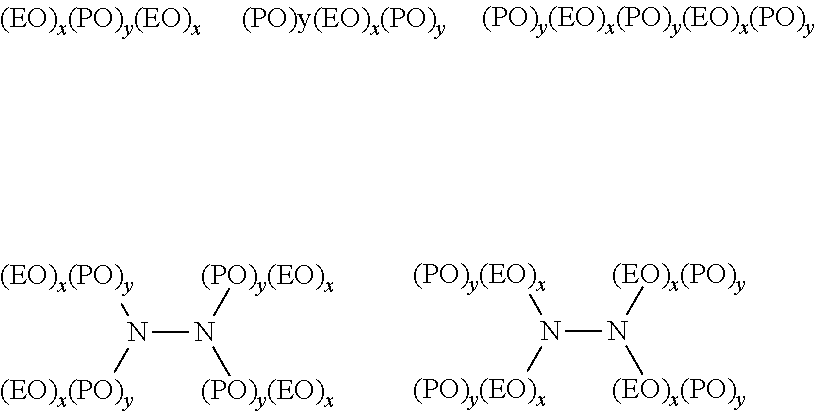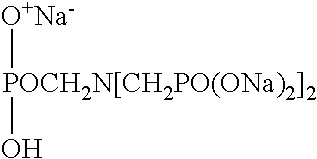Dimensionally stable solid rinse aid
a solid rinse and stable technology, applied in the direction of detergent powder/flakes/sheets, detergent compounding agents, foam regulating compositions, etc., can solve the problems of difficult to provide suitable combinations of high foaming surfactants and defoamers to achieve desired effects, and difficult to provide defoaming agents that are chemically quite complicated, so as to reduce the stability of foam
- Summary
- Abstract
- Description
- Claims
- Application Information
AI Technical Summary
Benefits of technology
Problems solved by technology
Method used
Image
Examples
example 1
Solid Rinse Aid Compositions
[0142]Each of the formulations, A through F, according to the present invention includes the combination Sodium Sulfate and urea for solid formation with defoamer (Polyoxypropylene polyoxyethylene Block copolymer) and a sheeting agent (solid alcohol ethoxylates), as well as sufficient acid (sorbic, benzoic and sodium bisulfate) acting as effective preservative. Example formulas D and F are also GRAS and biodegradable. In contrast, the conventional solid rinse aid uses propylene glycol and urea at lower water content water for solidification.
FormulationConventionalIngredientsABCDEFSolid Rinse AidWater12.5012.5012.5012.5012.5012.503.29alcohol ethoxylates20.1120.1120.1120.1127.3727.37—Polyoxypropylene14.0814.0814.08—19.16—64.62polyoxyethylene Blockcopolymer (LDO-97)Polyoxypropylene5.675.675.67—8.21—9.00polyoxyethylene Blockcopolymer (DO-97)polydimethyl1.211.211.211.21———siloxones (30%)Polyoxypropylene———23.44—27.37—polyoxyethylene Blockcopolymer (Plurafac25R...
example 2
Stable Form Formation Assessment
[0146]In this example, a series of tests were run to compare the foam profiles of several of the raw materials (i.e. sheeting agents and defoamers) by themselves, in certain combinations with each other, and in combination with selected solid rinse aids of the present invention as well as a conventional solid rinse aid. The formulations are provided in Example 1. The foam level and foam stability was read after one minute of agitation and again after 5 minutes of agitation. This test was done at 140° F. under 6 atmospheres of pressure in a Glewwe Foam Testing Machine, with 50 ppm of active agent added, at an Ecolab Inc. facility. Stable foam was defined as foam that remains for several minutes after agitation is stopped. Partially stable foam was defined as foam that breaks slowly within a minute. Unstable foam was defined by foam that breaks rapidly (i.e., breaks in less than 15 seconds). The results of the tests are shown in Table 2.
TABLE 2Glewwe Fo...
example 3
Sheeting Performance
[0147]In this example, sheeting ability during warewashing of a solid rinse aid of the present invention and a conventional rinse aid are tested. The ingredients for Formulation C of the present invention and the conventional rinse aid are provided in Example 1. For the sheeting evaluation, a number of warewash materials were exposed to the rinse aid formulations during a series of 30 second cycles using 150° F.-160° F. water. The warewash materials used for the evaluation were a china dinner plate, a glass panel or slide, a 10 oz. glass tumbler, a melamine dinner plate, a stainless steel butter knife, and a stainless steel panel or slide. These warewash materials were meticulously cleaned prior to the test and then soiled with a solution containing a 0.2% hotpoint soil, which is a mixture of powder milk and margarine. The amount of each rinse aid formulation that was used during the wash cycles was quantified in Tables 2 and 3 as parts per million surfactant.
[01...
PUM
| Property | Measurement | Unit |
|---|---|---|
| wt. % | aaaaa | aaaaa |
| wt. % | aaaaa | aaaaa |
| wt. % | aaaaa | aaaaa |
Abstract
Description
Claims
Application Information
 Login to View More
Login to View More - R&D
- Intellectual Property
- Life Sciences
- Materials
- Tech Scout
- Unparalleled Data Quality
- Higher Quality Content
- 60% Fewer Hallucinations
Browse by: Latest US Patents, China's latest patents, Technical Efficacy Thesaurus, Application Domain, Technology Topic, Popular Technical Reports.
© 2025 PatSnap. All rights reserved.Legal|Privacy policy|Modern Slavery Act Transparency Statement|Sitemap|About US| Contact US: help@patsnap.com


